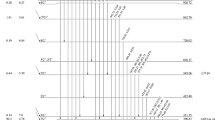Abstract
As described in a previous communication,1 we have found from the hyperfine structure of the lead spectrum that the ordinary element contains, in addition to Pb208, Pb206, and Pb207, a fourth isotope, Pb204, with an intensity of 1 per cent. Owing to the presence of mercury (particularly Hg204) in the discharge, the first analysis of lead by means of the mass spectrograph could not detect this new isotope. Recently, Aston2 has repeated his analysis and reported Pb204, together with four other weaker isotopes (209, 203, 205, and 210).
This is a preview of subscription content, access via your institution
Access options
Subscribe to this journal
Receive 51 print issues and online access
$199.00 per year
only $3.90 per issue
Buy this article
- Purchase on Springer Link
- Instant access to full article PDF
Prices may be subject to local taxes which are calculated during checkout
Similar content being viewed by others
References
H. Schüler and E. G. Jones, Naturwiss, 20, 171; 1932.
F. W. Aston, Nature, 129, 649; April 30, 1932.
H. Schüler and J. E. Keyston, Z. Phys., 70, 1; 1931; confirmed By F. W. Aston, NATURE, 128, 725, Oct. 24, 1931.
Author information
Authors and Affiliations
Rights and permissions
About this article
Cite this article
SCHULER, H., JONES, E. Isotopic Constitution of Lead. Nature 129, 833–834 (1932). https://doi.org/10.1038/129833d0
Issue Date:
DOI: https://doi.org/10.1038/129833d0
Comments
By submitting a comment you agree to abide by our Terms and Community Guidelines. If you find something abusive or that does not comply with our terms or guidelines please flag it as inappropriate.



